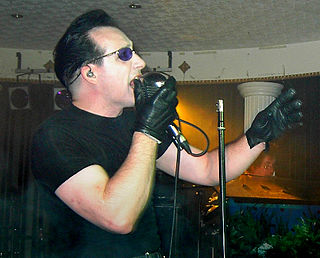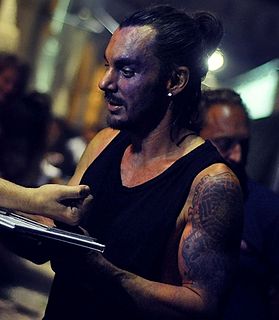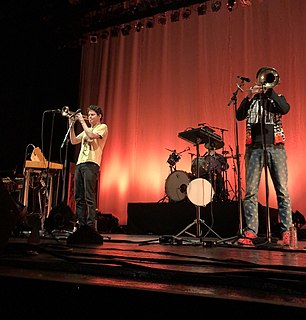A Quote by Steven Wilson
The nature of music fandom and music fans is that, very often, they fall in love with a band or a particular artist, and they really would like... I'm talking generally; that's not everyone. But a vast majority of the fan base would prefer the band to keep making the same record and the same style of music over and over again.
Related Quotes
I do not want and will not take a royalty on any record I record. I think paying a royalty to a producer or engineer is ethically indefensible. The band write the songs. The band play the music. It's the band's fans who buy the records. The band is responsible for whether it's a great record or a horrible record. Royalties belong to the band. I would like to be paid like a plumber. I do the job and you pay me what it's worth.
I was a huge fan of this band called Sparks. It was a pretty good inauguration to music since their music is quite complex. They were a little glammy, and me - being a kid and not really understanding the complexity of grown-up lyrics - I took the best out of it. But at the same time, it was mysterious enough and too far away from me for me to really be able to reach it. But they were my first love affair in the world of music. I loved that band.
I was 21, and I was like, "Man, am I really gonna start over and try this whole thing over again? Do I want to start over and be in a rock band again and try to act like a 17-year-old for as long as I can?" Because that was what I was doing with Simon Dawes band. I decided that if I was going to go on playing music, I was going to try and work on it. So I got into Leonard Cohen and Will Oldham, guys that really inspired me not only as songwriters but also through their music as people, and that's kind of what the shift was for me.
I enjoy making music alone, and I like keeping my options open for how I release my own songs. But everybody in Grizzly Bear is full of ideas. So it's kind of boring to come to the band with a complete song and be like: "Here's what I want you to do." With this record, we wanted to make everything feel like everyone - music that we could never do on our own. That's a real gift, and it's one of the best things about being in a band like this.
Unfortunately, you don't get artist development anymore. Record companies have become a huge corporate thing. It used to be you'd meet someone [in the business] and they'd have a little history of music. Some people in the companies now don't even like music. It's just a job. So I miss the days when someone would go out on a limb and pick a band that was different. I just don't see that anymore. It's the same with the film industry.
Because of the irresistible nature of our own Imagos, I think the replication of it in music is a siren song - we love those tormented songs, and we listen to them over and over and over the way that we smash ourselves into our lovers, or the same kind of lover, over and over. That drive is tireless, until it is resolved. And we can "enjoy" it safely through music, which is a simulacrum we have power over.
I think for us, we don't feel like the future of music is in the act of being a record company. We feel like the future of the music business is in empowering artists to have better and better tools to communicate with their fans. We want to be people who are saying to artists, "Look, you don't need that company over there to release your album. You can do it this way." Almost more of a band partnership than a label-artist relationship. Not about ownership of content, but about empowerment.




































